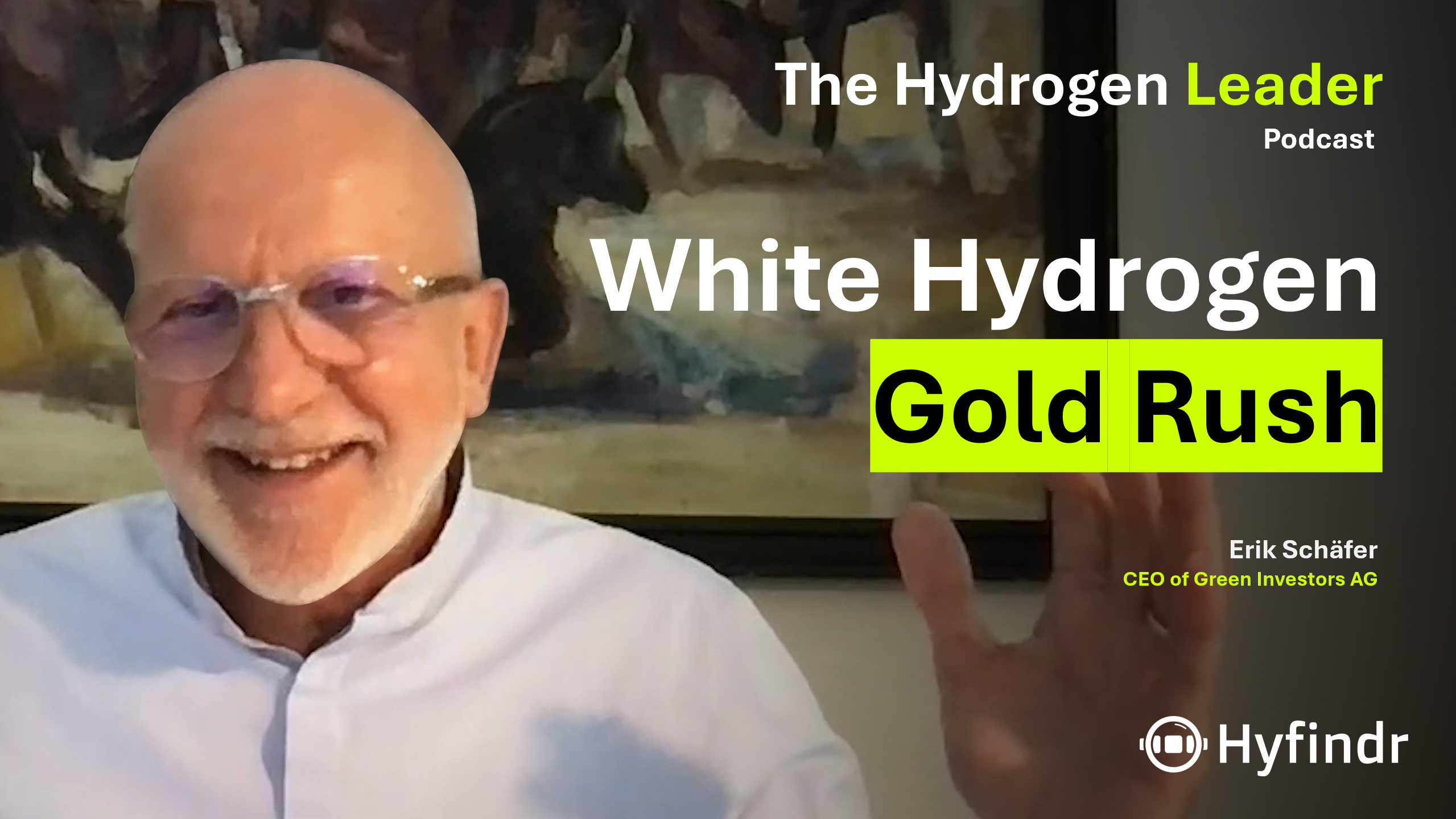In this episode of The Hydrogen Leader podcast, we sit down with Erik Schäfer, an experienced entrepreneur passionate about green technology and the hydrogen economy. Having founded nearly 20 companies over the last 30 years, Erik has built an impressive career that spans industries from Silicon Valley’s tech scene to natural resources and green energy.
Erik shares his journey into the emerging world of natural hydrogen, a revolutionary sector that focuses on extracting hydrogen directly from the earth, known as geological or white hydrogen. In this conversation, he discusses the advantages of natural hydrogen, the challenges it faces in terms of regulatory frameworks, and its potential role in the global energy transition.
What is Natural Hydrogen and How Does It Differ from Green Hydrogen?
Erik introduces the concept of white hydrogen, which refers to hydrogen that occurs naturally in the earth and can be extracted without the need for industrial production processes. Why is white hydrogen such an exciting breakthrough in the hydrogen economy? Erik explains how it offers a lower production cost and a smaller ecological footprint compared to traditional and green hydrogen, making it a potentially game-changing solution for the energy transition.
What makes white hydrogen so unique, and why is it important for the future of energy? Schäfer dives into the benefits of tapping into natural hydrogen sources, particularly in areas like the Middle East and North Africa, where large quantities of hydrogen have been discovered.
How Significant Is the Discovery of Natural Hydrogen in the Middle East?
Erik shares his work on natural hydrogen projects in the UAE and Oman, where significant quantities of hydrogen have been identified. What is the potential of white hydrogen in regions like the Middle East? Schäfer discusses how these discoveries could play a critical role in meeting the world’s growing hydrogen demand and their broader economic and environmental impact.
He also explores how these discoveries could alter the global energy landscape by providing access to hydrogen that doesn’t require energy-intensive production, contributing to a sustainable hydrogen economy.
What Are the Regulatory Challenges Facing Natural Hydrogen?
Despite its potential, natural hydrogen still faces regulatory hurdles that need to be addressed for it to become a viable part of the global energy transition. What steps are necessary to make natural hydrogen a mainstream solution? Erik highlights the key regulatory challenges and the importance of collaboration between investors, project developers, and regulators in creating the necessary framework for this emerging industry.
How can regulatory bodies support the growth of natural hydrogen? Erik shares his insights into the role of policy makers in accelerating the adoption of natural hydrogen technologies.
What Is Zenko and How Does It Help Fund the Hydrogen Revolution?
Erik is also involved in Zenko, a hydrogen fund that aims to bridge the financing gap in the hydrogen industry. What is the role of investment in driving hydrogen innovation, and how does Zenko contribute to this effort? Erik discusses the challenges of financing hydrogen projects, the risks involved, and how Zenko invests in later-stage companies to support the scaling of hydrogen technologies.
How can collaboration between investors, regulators, and developers foster a more sustainable and successful hydrogen economy? Erik emphasizes the importance of these partnerships in bringing innovative hydrogen solutions to market.
What Is the Global Interest in Natural Hydrogen?
As interest in geologic hydrogen grows, Erik reflects on the global potential of natural hydrogen. How is global investment shifting toward this sector, and what does it mean for the future of hydrogen energy? Erik shares how regions like the Middle East are positioning themselves as key players in this new energy landscape, drawing international investment and research into natural hydrogen extraction.
He also talks about the growing enthusiasm for natural hydrogen in Europe and how the region’s push for sustainable solutions has paved the way for deeper collaborations in the hydrogen sector.
What Are the Challenges and Opportunities for Natural Hydrogen?
Erik acknowledges the challenges of purification and scalability when it comes to natural hydrogen, but he remains optimistic about the sector’s long-term potential. What are the biggest obstacles standing in the way of large-scale natural hydrogen production, and how can they be overcome? Erik explains the technical and logistical hurdles that need to be addressed before natural hydrogen can become a mainstream energy source.
At the same time, he emphasizes the immense opportunities in this space, highlighting the potential for natural hydrogen to transform the global energy system and become a key player in hydrogen decarbonization.
What Does the Future Hold for Natural Hydrogen?
As the podcast concludes, Erik shares his vision for the future of natural hydrogen. What does the future hold for the natural hydrogen industry, and how can it contribute to the broader energy transition? Erik is optimistic about the potential for natural hydrogen to drive both economic and environmental benefits, particularly in regions rich in natural resources.
He calls on others to join him in pioneering this emerging technology, emphasizing the importance of innovation, collaboration, and the drive to create a sustainable future.
To learn more about natural hydrogen, listen to the full podcast episode with Erik Schäfer here.
If you found this discussion valuable, don’t forget to subscribe to The Hydrogen Leader podcast. Join Dr. Björn Lüssow for more expert interviews on leadership, innovation, and the future of the hydrogen economy.

